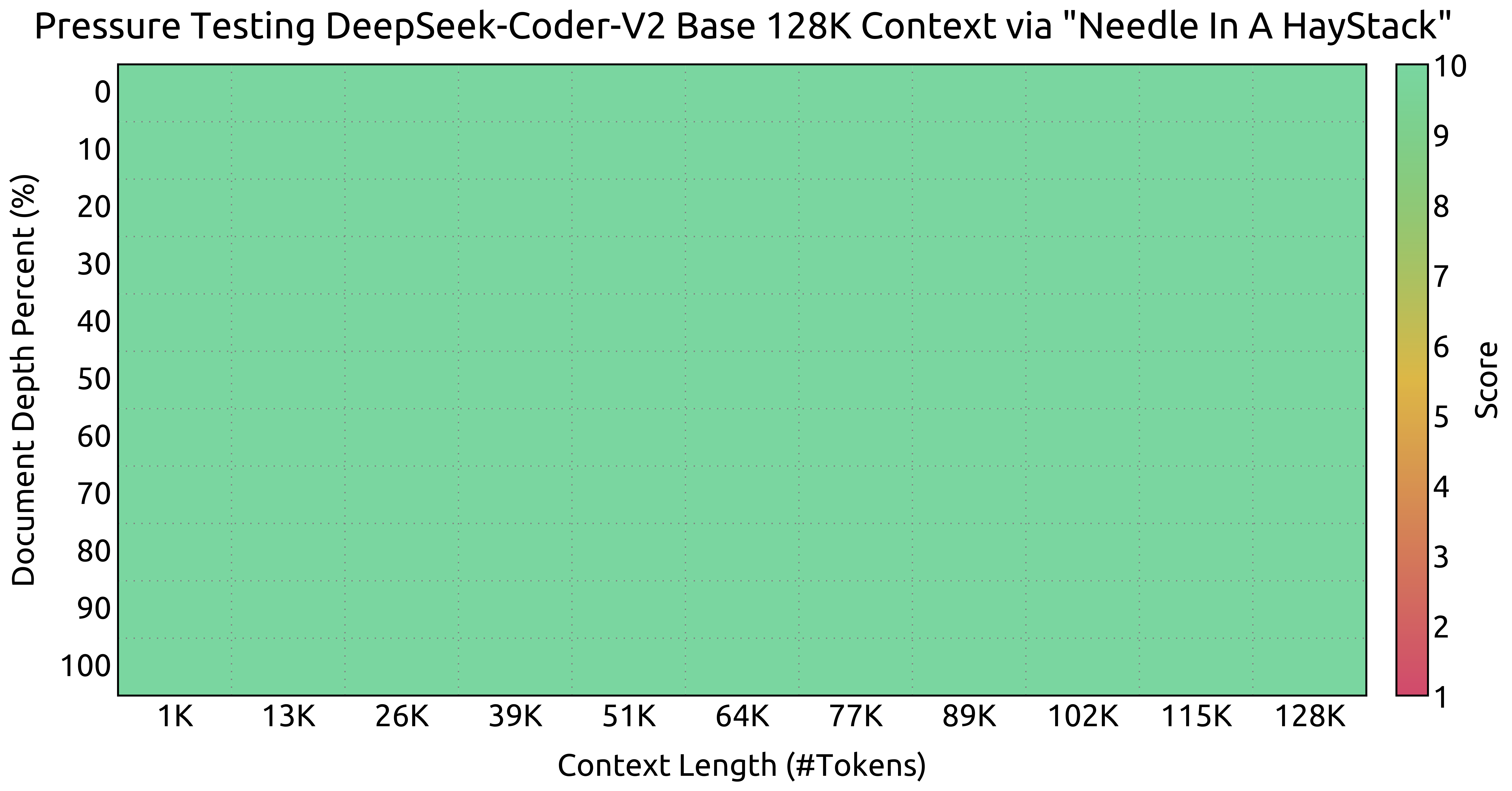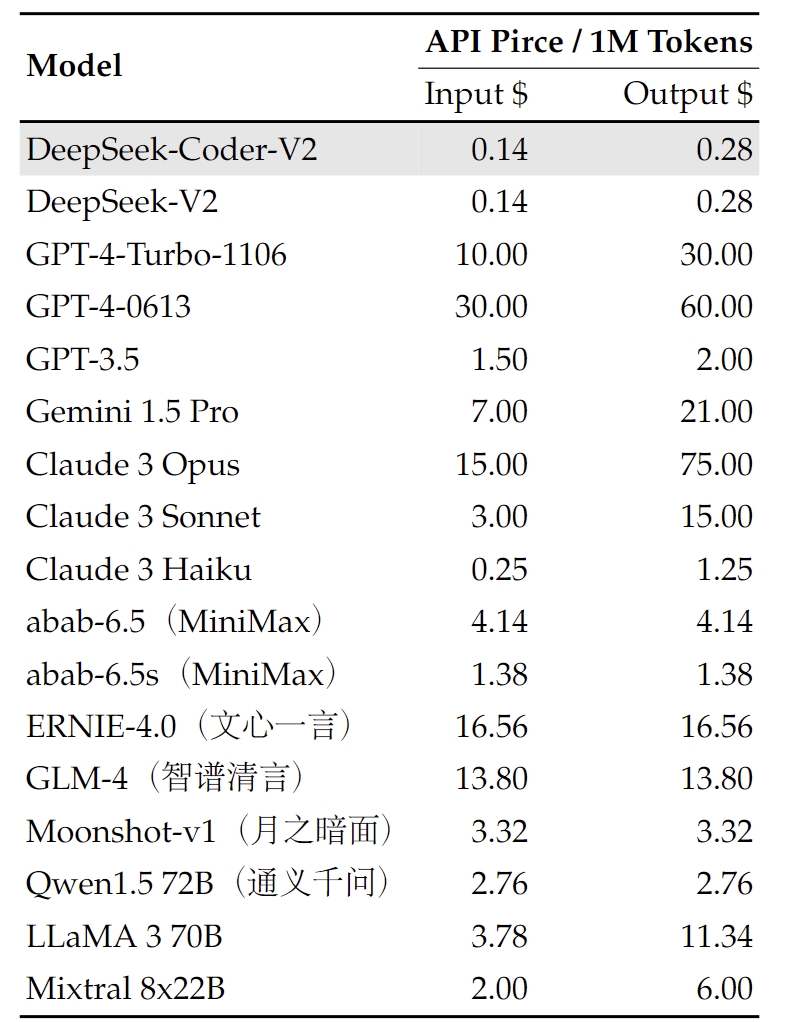We present DeepSeek-Coder-V2, an open-source Mixture-of-Experts (MoE) code language model that achieves performance comparable to GPT4-Turbo in code-specific tasks. Specifically, DeepSeek-Coder-V2 is further pre-trained from an intermediate checkpoint of DeepSeek-V2 with additional 6 trillion tokens. Through this continued pre-training, DeepSeek-Coder-V2 substantially enhances the coding and mathematical reasoning capabilities of DeepSeek-V2, while maintaining comparable performance in general language tasks.
Compared to DeepSeek-Coder-33B, DeepSeek-Coder-V2 demonstrates significant advancements in various aspects of code-related tasks, as well as reasoning and general capabilities. Additionally, DeepSeek-Coder-V2 expands its support for programming languages from 86 to 338, while extending the context length from 16K to 128K.
Model Download | Evaluation Results | API Platform | How to Use | License | Citation
DeepSeek-Coder-V2: Breaking the Barrier of Closed-Source Models in Code Intelligence
1. Introduction

In standard benchmark evaluations, DeepSeek-Coder-V2 achieves superior performance compared to closed-source models such as GPT4-Turbo, Claude 3 Opus, and Gemini 1.5 Pro in coding and math benchmarks. The list of supported programming languages can be found here.
2. Model Downloads
We release the DeepSeek-Coder-V2 with 16B and 236B parameters based on the DeepSeekMoE framework, which has actived parameters of only 2.4B and 21B , including base and instruct models, to the public.
| Model | #Total Params | #Active Params | Context Length | Download |
|---|---|---|---|---|
| DeepSeek-Coder-V2-Lite-Base | 16B | 2.4B | 128k | 🤗 HuggingFace |
| DeepSeek-Coder-V2-Lite-Instruct | 16B | 2.4B | 128k | 🤗 HuggingFace |
| DeepSeek-Coder-V2-Base | 236B | 21B | 128k | 🤗 HuggingFace |
| DeepSeek-Coder-V2-Instruct | 236B | 21B | 128k | 🤗 HuggingFace |
3. Evaluation Results
3.1 Code Generation
| #TP | #AP | HumanEval | MBPP+ | LiveCodeBench | USACO | |
|---|---|---|---|---|---|---|
| Closed-Source Models | ||||||
| Gemini-1.5-Pro | - | - | 83.5 | 74.6 | 34.1 | 4.9 |
| Claude-3-Opus | - | - | 84.2 | 72.0 | 34.6 | 7.8 |
| GPT-4-Turbo-1106 | - | - | 87.8 | 69.3 | 37.1 | 11.1 |
| GPT-4-Turbo-0409 | - | - | 88.2 | 72.2 | 45.7 | 12.3 |
| GPT-4o-0513 | - | - | 91.0 | 73.5 | 43.4 | 18.8 |
| Open-Source Models | ||||||
| CodeStral | 22B | 22B | 78.1 | 68.2 | 31.0 | 4.6 |
| DeepSeek-Coder-Instruct | 33B | 33B | 79.3 | 70.1 | 22.5 | 4.2 |
| Llama3-Instruct | 70B | 70B | 81.1 | 68.8 | 28.7 | 3.3 |
| DeepSeek-Coder-V2-Lite-Instruct | 16B | 2.4B | 81.1 | 68.8 | 24.3 | 6.5 |
| DeepSeek-Coder-V2-Instruct | 236B | 21B | 90.2 | 76.2 | 43.4 | 12.1 |
3.2 Code Completion
| Model | #TP | #AP | RepoBench (Python) | RepoBench (Java) | HumanEval FIM |
|---|---|---|---|---|---|
| CodeStral | 22B | 22B | 46.1 | 45.7 | 83.0 |
| DeepSeek-Coder-Base | 7B | 7B | 36.2 | 43.3 | 86.1 |
| DeepSeek-Coder-Base | 33B | 33B | 39.1 | 44.8 | 86.4 |
| DeepSeek-Coder-V2-Lite-Base | 16B | 2.4B | 38.9 | 43.3 | 86.4 |
3.3 Code Fixing
| #TP | #AP | Defects4J | SWE-Bench | Aider | |
|---|---|---|---|---|---|
| Closed-Source Models | |||||
| Gemini-1.5-Pro | - | - | 18.6 | 19.3 | 57.1 |
| Claude-3-Opus | - | - | 25.5 | 11.7 | 68.4 |
| GPT-4-Turbo-1106 | - | - | 22.8 | 22.7 | 65.4 |
| GPT-4-Turbo-0409 | - | - | 24.3 | 18.3 | 63.9 |
| GPT-4o-0513 | - | - | 26.1 | 26.7 | 72.9 |
| Open-Source Models | |||||
| CodeStral | 22B | 22B | 17.8 | 2.7 | 51.1 |
| DeepSeek-Coder-Instruct | 33B | 33B | 11.3 | 0.0 | 54.5 |
| Llama3-Instruct | 70B | 70B | 16.2 | - | 49.2 |
| DeepSeek-Coder-V2-Lite-Instruct | 16B | 2.4B | 9.2 | 0.0 | 44.4 |
| DeepSeek-Coder-V2-Instruct | 236B | 21B | 21.0 | 12.7 | 73.7 |
3.4 Mathematical Reasoning
| #TP | #AP | GSM8K | MATH | AIME 2024 | Math Odyssey | |
|---|---|---|---|---|---|---|
| Closed-Source Models | ||||||
| Gemini-1.5-Pro | - | - | 90.8 | 67.7 | 2/30 | 45.0 |
| Claude-3-Opus | - | - | 95.0 | 60.1 | 2/30 | 40.6 |
| GPT-4-Turbo-1106 | - | - | 91.4 | 64.3 | 1/30 | 49.1 |
| GPT-4-Turbo-0409 | - | - | 93.7 | 73.4 | 3/30 | 46.8 |
| GPT-4o-0513 | - | - | 95.8 | 76.6 | 2/30 | 53.2 |
| Open-Source Models | ||||||
| Llama3-Instruct | 70B | 70B | 93.0 | 50.4 | 1/30 | 27.9 |
| DeepSeek-Coder-V2-Lite-Instruct | 16B | 2.4B | 86.4 | 61.8 | 0/30 | 44.4 |
| DeepSeek-Coder-V2-Instruct | 236B | 21B | 94.9 | 75.7 | 4/30 | 53.7 |
3.5 General Natural Language
| Benchmark | Domain | DeepSeek-V2-Lite Chat | DeepSeek-Coder-V2-Lite Instruct | DeepSeek-V2 Chat | DeepSeek-Coder-V2 Instruct |
|---|---|---|---|---|---|
| BBH | English | 48.1 | 61.2 | 79.7 | 83.9 |
| MMLU | English | 55.7 | 60.1 | 78.1 | 79.2 |
| ARC-Easy | English | 86.1 | 88.9 | 98.1 | 97.4 |
| ARC-Challenge | English | 73.4 | 77.4 | 92.3 | 92.8 |
| TriviaQA | English | 65.2 | 59.5 | 86.7 | 82.3 |
| NaturalQuestions | English | 35.5 | 30.8 | 53.4 | 47.5 |
| AGIEval | English | 42.8 | 28.7 | 61.4 | 60 |
| CLUEWSC | Chinese | 80.0 | 76.5 | 89.9 | 85.9 |
| C-Eval | Chinese | 60.1 | 61.6 | 78.0 | 79.4 |
| CMMLU | Chinese | 62.5 | 62.7 | 81.6 | 80.9 |
| Arena-Hard | - | 11.4 | 38.1 | 41.6 | 65.0 |
| AlpaceEval 2.0 | - | 16.9 | 17.7 | 38.9 | 36.9 |
| MT-Bench | - | 7.37 | 7.81 | 8.97 | 8.77 |
| Alignbench | - | 6.02 | 6.83 | 7.91 | 7.84 |
3.6 Context Window

Evaluation results on the Needle In A Haystack (NIAH) tests. DeepSeek-Coder-V2 performs well across all context window lengths up to 128K.
4. Chat Website
You can chat with the DeepSeek-Coder-V2 on DeepSeek’s official website: coder.deepseek.com
5. API Platform
We also provide OpenAI-Compatible API at DeepSeek Platform: platform.deepseek.com, and you can also pay-as-you-go at an unbeatable price.

6. How to run locally
Here, we provide some examples of how to use DeepSeek-Coder-V2-Lite model. If you want to utilize DeepSeek-Coder-V2 in BF16 format for inference, 80GB*8 GPUs are required.
Inference with Huggingface’s Transformers
You can directly employ Huggingface’s Transformers for model inference.
Code Completion
from transformers import AutoTokenizer, AutoModelForCausalLM
import torch
tokenizer = AutoTokenizer.from_pretrained("deepseek-ai/DeepSeek-Coder-V2-Lite-Base", trust_remote_code=True)
model = AutoModelForCausalLM.from_pretrained("deepseek-ai/DeepSeek-Coder-V2-Lite-Base", trust_remote_code=True, torch_dtype=torch.bfloat16).cuda()
input_text = "#write a quick sort algorithm"
inputs = tokenizer(input_text, return_tensors="pt").to(model.device)
outputs = model.generate(**inputs, max_length=128)
print(tokenizer.decode(outputs[0], skip_special_tokens=True))
Code Insertion
from transformers import AutoTokenizer, AutoModelForCausalLM
import torch
tokenizer = AutoTokenizer.from_pretrained("deepseek-ai/DeepSeek-Coder-V2-Lite-Base", trust_remote_code=True)
model = AutoModelForCausalLM.from_pretrained("deepseek-ai/DeepSeek-Coder-V2-Lite-Base", trust_remote_code=True, torch_dtype=torch.bfloat16).cuda()
input_text = """<|fim▁begin|>def quick_sort(arr):
if len(arr) <= 1:
return arr
pivot = arr[0]
left = []
right = []
<|fim▁hole|>
if arr[i] < pivot:
left.append(arr[i])
else:
right.append(arr[i])
return quick_sort(left) + [pivot] + quick_sort(right)<|fim▁end|>"""
inputs = tokenizer(input_text, return_tensors="pt").to(model.device)
outputs = model.generate(**inputs, max_length=128)
print(tokenizer.decode(outputs[0], skip_special_tokens=True)[len(input_text):])
Chat Completion
from transformers import AutoTokenizer, AutoModelForCausalLM
import torch
tokenizer = AutoTokenizer.from_pretrained("deepseek-ai/DeepSeek-Coder-V2-Lite-Instruct", trust_remote_code=True)
model = AutoModelForCausalLM.from_pretrained("deepseek-ai/DeepSeek-Coder-V2-Lite-Instruct", trust_remote_code=True, torch_dtype=torch.bfloat16).cuda()
messages=[
{ 'role': 'user', 'content': "write a quick sort algorithm in python."}
]
inputs = tokenizer.apply_chat_template(messages, add_generation_prompt=True, return_tensors="pt").to(model.device)
# tokenizer.eos_token_id is the id of <|end▁of▁sentence|> token
outputs = model.generate(inputs, max_new_tokens=512, do_sample=False, top_k=50, top_p=0.95, num_return_sequences=1, eos_token_id=tokenizer.eos_token_id)
print(tokenizer.decode(outputs[0][len(inputs[0]):], skip_special_tokens=True))
The complete chat template can be found within tokenizer_config.json located in the huggingface model repository.
An example of chat template is as belows:
<|begin▁of▁sentence|>User: {user_message_1}
Assistant: {assistant_message_1}<|end▁of▁sentence|>User: {user_message_2}
Assistant:
You can also add an optional system message:
<|begin▁of▁sentence|>{system_message}
User: {user_message_1}
Assistant: {assistant_message_1}<|end▁of▁sentence|>User: {user_message_2}
Assistant:
In the last round of dialogue, note that “Assistant:” has no space after the colon. Adding a space might cause the following issues on the 16B-Lite model:
- English questions receiving Chinese responses.
- Responses containing garbled text.
- Responses repeating excessively.
Older versions of Ollama had this bug (see https://github.com/deepseek-ai/DeepSeek-Coder-V2/issues/12), but it has been fixed in the latest version.
Inference with SGLang (recommended)
SGLang currently supports MLA optimizations, FP8 (W8A8), FP8 KV Cache, and Torch Compile, offering the best latency and throughput among open-source frameworks. Here are some example commands to launch an OpenAI API-compatible server:
# BF16, tensor parallelism = 8
python3 -m sglang.launch_server --model deepseek-ai/DeepSeek-Coder-V2-Instruct --tp 8 --trust-remote-code
# BF16, w/ torch.compile (The compilation can take several minutes)
python3 -m sglang.launch_server --model deepseek-ai/DeepSeek-Coder-V2-Lite-Instruct --trust-remote-code --enable-torch-compile
# FP8, tensor parallelism = 8, FP8 KV cache
python3 -m sglang.launch_server --model neuralmagic/DeepSeek-Coder-V2-Instruct-FP8 --tp 8 --trust-remote-code --kv-cache-dtype fp8_e5m2
After launching the server, you can query it with OpenAI API
import openai
client = openai.Client(
base_url="http://127.0.0.1:30000/v1", api_key="EMPTY")
# Chat completion
response = client.chat.completions.create(
model="default",
messages=[
{"role": "system", "content": "You are a helpful AI assistant"},
{"role": "user", "content": "List 3 countries and their capitals."},
],
temperature=0,
max_tokens=64,
)
print(response)
Inference with vLLM (recommended)
To utilize vLLM for model inference, please merge this Pull Request into your vLLM codebase: https://github.com/vllm-project/vllm/pull/4650.
from transformers import AutoTokenizer
from vllm import LLM, SamplingParams
max_model_len, tp_size = 8192, 1
model_name = "deepseek-ai/DeepSeek-Coder-V2-Lite-Instruct"
tokenizer = AutoTokenizer.from_pretrained(model_name)
llm = LLM(model=model_name, tensor_parallel_size=tp_size, max_model_len=max_model_len, trust_remote_code=True, enforce_eager=True)
sampling_params = SamplingParams(temperature=0.3, max_tokens=256, stop_token_ids=[tokenizer.eos_token_id])
messages_list = [
[{"role": "user", "content": "Who are you?"}],
[{"role": "user", "content": "write a quick sort algorithm in python."}],
[{"role": "user", "content": "Write a piece of quicksort code in C++."}],
]
prompt_token_ids = [tokenizer.apply_chat_template(messages, add_generation_prompt=True) for messages in messages_list]
outputs = llm.generate(prompt_token_ids=prompt_token_ids, sampling_params=sampling_params)
generated_text = [output.outputs[0].text for output in outputs]
print(generated_text)
7. License
This code repository is licensed under the MIT License. The use of DeepSeek-Coder-V2 Base/Instruct models is subject to the Model License. DeepSeek-Coder-V2 series (including Base and Instruct) supports commercial use.
8. Citation
@article{zhu2024deepseek,
title={DeepSeek-Coder-V2: Breaking the Barrier of Closed-Source Models in Code Intelligence},
author={Zhu, Qihao and Guo, Daya and Shao, Zhihong and Yang, Dejian and Wang, Peiyi and Xu, Runxin and Wu, Y and Li, Yukun and Gao, Huazuo and Ma, Shirong and others},
journal={arXiv preprint arXiv:2406.11931},
year={2024}
}
9. Contact
If you have any questions, please raise an issue or contact us at service@deepseek.com.





